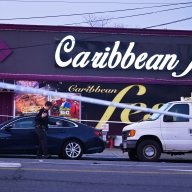By Ayala Ben-Yehuda
Orion Telecommunications Corporation, the prepaid phone card company that has turned the former Associated supermarket on Bell Boulevard into its sales headquarters, has even bigger plans to grow its business in the next few months.
The Bayside company has 14 offices in Queens, nearly all of them on Bell Boulevard, and employs about 400 people in the area, said Dom DiMartini Jr., the company’s training manager.
An additional 50 employees are in locations around the country, including Seattle and Florida, DiMartini said.
“We’re known as an honest business,” said DiMartini, explaining that Orion’s nearly six years in operation are unusual in an industry filled with companies whose unscrupulous owners leave the country after making a quick profit.
The company is privately held and expects to gross $350 million this year. DiMartini said it is second in the prepaid phone card industry behind the Newark, N.J.-based IDT Corporation, a publicly traded telecommunications company.
About 20 percent of Orion’s workers live in Bayside and walk to work, including the company’s chief executive officer, Peter P. Sicilian Jr.
A single office building that could house all 400 employees could not be found, said DiMartini, who added that Sicilian, a Bayside native, preferred to stay in the neighborhood.
Pedestrians on Bell Blvd. have noticed the quick takeover of storefronts by the low-profile company, which uses the abbreviation “OTC” on its doors.
Behind the tinted glass and minimal signage are offices named after the businesses that used to occupy the space or their neighbors. Sicilian’s main office is located above the Bourbon Street restaurant and is known within the company as Bourbon, for example.
The 14 offices each have a different function, such as training, finance, human resources, and collections, DiMartini said.
The company is headquartered on the first floor of the Bell Plaza building and houses a 24-hour customer service center filled with several dozen workers speaking multiple languages.
When the company was formed in 1997, it targeted Korean-American grocers as end-sellers of the phone cards, according to the company history.
“OTC bases its cities’ targets on high volume markets based on ethnicity,” according to a company training manual.
The company’s target market consists mainly of “unbanked” immigrants who tend not to have bank accounts or home phone service and make many calls to their home countries from pay phones.
The Associated building has been converted to offices and conference rooms for the sales teams, with its basement being used to conduct market research.
A tightly guarded warehouse on Northern Boulevard stores the phone cards that are sold to distributors, who either sell them directly to bodegas and phone stores or sell them to sub-distributors who sell to retailers, DiMartini said.
The company’s top executives come from the food and beverage industries and thus have experience getting their products into small grocery stores, said DiMartini.
Although the OTC name is ubiquitous on Bell Blvd., none of the street’s retailers currently sell the company’s phone cards.
DiMartini explained that when Orion entered the phone card business in the late 1990s, the New York metro market was already flooded and the company decided to establish footholds in other parts of the country before selling its products in the city, as it is now starting to do.
The company routes up to 60 percent of its calls to Mexico, using its own network of 36 switches housed in a call routing center in Manhattan.
“We’re doing just about everything but dialing the call for you,” said DiMartini.
The company has started advertising on Spanish television networks, and DiMartini said it is planning to launch a TV ad campaign on the major networks in March featuring a well-known Latina model and television personality.
Orion is also branching out into new products such as prepaid cellular phones and phone cards that are activated through a scanner at retail locations instead of stored behind the counter to prevent theft of pre-activated cards.
The company is also courting major national retailers to manufacture and design their prepaid gift cards.
“This is basically the future,” said DiMartini of the gradual replacement of cash with prepaid cards. “It’s going to happen.”
Reach reporter Ayala Ben-Yehuda by e-mail at Timesledger@aol.com or call 1-718-229-0300, Ext. 146.

































